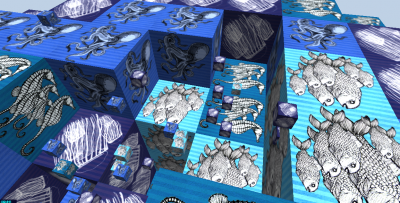You may recall meeting recent grad Rachel Law (MFA DT ’13) via our interview with her, following Parsons win against NYU in the Game Design Challenge at IndieCade East, last winter. Since graduating only a little over a month ago, the 25 year-old Law has wasted no time in working toward her goals of creatively defining data and, quite literally, playing with data-mining.
One of her projects is an illustrated, limited edition, Kickstarter-only book for art, tech & theory fans, made collaboratively with Lang faculty McKenzie Wark.
The other, which was just covered on Advertising Age, is her senior thesis, “Vortex,” –a browser extension that’s part game, part ad-targeting disrupter that helps people turn their user profiles and the browsing information into alternate fake identities that have nothing to do with reality.
“It’s a way of masking your identity across networks,” said Ms. Law. The addictive game (which is still in development), deemed “Site Miner,” allows players to fish for cookies visualized as sea creatures. Players can gobble up cookies Pac-Man style, creating a pool of profile information that has nothing to do with their actual web behavior, which could effectively shake up the online ad business! But Ms. Law states that she’s not against advertising.
I think targeting is harmful when confidential information, such as your medical issues or criminal records, is used against you as a form of price discrimination. Retailers should not be able to discriminate based on health history, whether or not you’ve committed a crime before, your sexual preferences or history, etc., because this is private information pertaining to an individual.
I like to imagine in the future targeted advertising becomes a targeted choice for both advertisers and users,” she said. “For instance, if a user decides to go shoe-shopping for summer, he or she could equip their browser with the cookies most associated and aligned with shopping, shoes and summer … users can choose what kind of advertisements they want to see.





